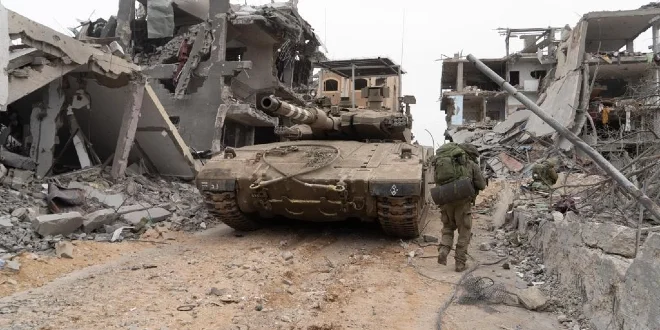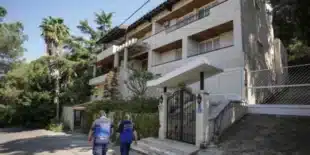Over the weekend, intense conflict in the Gaza Strip led to the deaths of 14 Israeli soldiers, as announced by the Israeli military on Sunday. These casualties are among the highest since the ground offensive began, underscoring Hamas’ continued resistance despite the prolonged and fierce warfare.
The rising death toll among Israeli troops could significantly influence public opinion in Israel about the war. The conflict was ignited when Hamas-led militants attacked southern Israeli communities on October 7, reportedly killing 1,200 and taking 240 hostages, according to Israeli sources. The war has ravaged parts of Gaza, claiming the lives of approximately 20,400 Palestinians and displacing almost 85% of Gaza’s 2.3 million population.
Hamas-controlled Gaza’s Health Ministry reported 166 deaths in the region in the past day.
Despite international pressure and the escalating Palestinian death toll, Israeli support largely remains firm for the objectives of dismantling Hamas’ governance and military capabilities and securing the release of the remaining 129 captives.
However, the increasing loss of Israeli soldiers may start to sway this support. In Israel, where military service is mandatory for most Jewish citizens, the death of soldiers is a profoundly sensitive issue. With a population of about 9 million, the impact of these losses is widely felt, as most families know someone affected by war casualties.
The 14 soldiers who died on Friday and Saturday perished in central and southern Gaza, indicating Hamas’ tenacious resistance against the Israeli forces. Israeli Army Radio reported that four soldiers died from an anti-tank missile hitting their vehicle, with others killed in separate skirmishes.
Another Israeli soldier was killed by Hezbollah militants in northern Israel, heightening concerns of a broader regional conflict.
These deaths bring the total number of Israeli soldiers killed since the ground offensive began to 153.
Israeli Prime Minister Benjamin Netanyahu, in a Cabinet meeting on Sunday, acknowledged the heavy toll of the war but asserted the necessity to continue fighting. He vowed to press on until all objectives, including the complete defeat of Hamas and the assurance of security in both the north and south, are achieved.
Despite widespread support for the war effort, there’s growing resentment towards Netanyahu’s government, criticized for its failure to protect civilians on October 7 and policies perceived as enabling Hamas’ strengthening.
A significant protest occurred in Tel Aviv on Saturday night, with attendees chanting against Netanyahu.
Netanyahu has deferred addressing criticisms of military and policy failures until after the fighting ceases.
The Israeli military, as stated by Rear Admiral Daniel Hagari, is intensifying its operations in Gaza, particularly in Khan Younis, where Hamas leaders are believed to be hiding.
The Israeli campaign has been devastating, particularly for Palestinian civilians, with more than two-thirds of the 20,000 casualties being women and children, according to Gaza’s Health Ministry.
A 13-year-old boy was reportedly killed by an Israeli drone strike at al-Amal Hospital in Khan Younis. Additionally, an Israeli attack in a Rafah refugee camp resulted in at least two deaths.
Palestinians reported intense bombardment and gunfire in Jabaliya, north of Gaza City, with Hamas militants engaging Israeli forces.
Rescuers and hospital officials reported that over 90 Palestinians, including many from one extended family, were killed in Israeli airstrikes on two homes in Gaza.
International criticism of Israel has intensified due to the high civilian death toll, the extensive damage, and the worsening humanitarian crisis in Gaza. Israel attributes the high civilian casualties to Hamas’ tactics of operating within crowded residential areas.
Israel claims to have killed thousands of Hamas militants and is focused on dismantling Hamas’ tunnel network and eliminating its leaders, a process expected to take months.
The U.N. Security Council’s recent resolution called for quick humanitarian aid delivery to Palestinians and the release of hostages but did not demand a ceasefire.
Following the U.N. resolution, the modalities and timing of increased aid deliveries remain uncertain. Both the Rafah and Kerem Shalom crossings were closed on Saturday.
U.N. High Commissioner for Refugees Filippo Grandi reiterated calls for a humanitarian ceasefire in Gaza to facilitate aid delivery and the release of hostages.
European nations have increased calls for an end to the fighting, while the U.S. continues to support Israel, albeit with heightened calls for civilian protection in Gaza.
U.S. President Joe Biden, in a conversation with Netanyahu, did not request a ceasefire, and Netanyahu asserted Israel’s determination to continue the war until achieving its goals.


